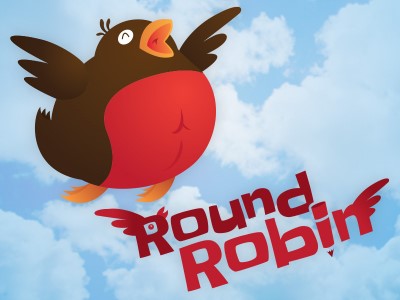
Round Robin Logo by Dylan Wilkinson
Back in the Spring of 2014, I had an idea. I had only recently gotten back into tabletop roleplaying after a few years’ hiatus; my only experiences with RPGs had been D&D and Star Wars (d6, SWSE, and FFG Star Wars). I decided that I wanted to expand my horizons and try as many different games and systems as possible.
There were a few challenges to pulling this off, however. For one thing, I didn’t have a local group to play with. Most of my undergrad gaming buds had moved away after graduating, while I was still in Orlando working towards my Master’s degree. I also wasn’t a very experienced GM. Sure, I had run a few campaigns over the years, but most of them were short-lived and ended in limbo. The idea of trying to run a bunch of different games (most of which I’d be trying for the first time) with a new group seemed daunting.
On the other hand, I did have a couple things going for me. For one, I had already amassed a large collection of PDFs of various games from DriveThruRPG. Sure, most of them remained unread and unplayed on my hard drive, but it was a good starting point. I also had found a few promising online resources for finding local groups. Hopefully that could help me find a group that would fit my needs (Spoiler Alert: it did – check out my article about online resources for finding groups/games if you’re interested in doing this yourself). So the only question left was how to go about organizing and managing playing a bunch of different games. Thankfully, I remembered the idea of Round-Robin GMing.
 Round-Robin GMing is by no means a new idea in the world of tabletop roleplaying. I’m fairly certain that groups have been using it since the creation of the first tabletop roleplaying games (let me know in the comments if you’re an old grognard who did). The idea behind Round-Robin GMing is simple, the members of the group take turns GMing. It’s up to the group to determine, which of the members will rotate GMing responsibility, how often they alternate, and whether or not they stick to a single campaign or play multiple campaigns/one-shots/games.
Round-Robin GMing is by no means a new idea in the world of tabletop roleplaying. I’m fairly certain that groups have been using it since the creation of the first tabletop roleplaying games (let me know in the comments if you’re an old grognard who did). The idea behind Round-Robin GMing is simple, the members of the group take turns GMing. It’s up to the group to determine, which of the members will rotate GMing responsibility, how often they alternate, and whether or not they stick to a single campaign or play multiple campaigns/one-shots/games.
In the case of my group, we decided that every member would take terms GMing unless they truly felt uncomfortable. We would alternate weekly, running a one-shot in a different game each session. We combined our collections of RPGs so that anyone could choose any of the games we had between us to run for the others. This way, everyone would have a chance to play on a regular basis, and no one person would have to take on the burden of learning a new system or preparing a new one-shot every week. The experiment ended up being a great success. Having a fun and enthusiastic group helped, of course, but Round-Robin GMing was the key to the smooth functioning of our group. During the months I played with my local group I got to try a lot of new games, some of which I hadn’t even heard of before. I got to experience Dungeon World, Call of Cthulhu, The Dresden Files, Microscope, One Last Job, and many more.
I highly recommend everyone try out Round-Robin GMing; I for one would not be nearly as well-versed or enthusiastic about roleplaying in general if I hadn’t. You can use it to sharpen your GMing skills as a group, avoid GM burnout, try many different games, and make sure that no one ends up being stuck as the “Forever GM.” If you’ve ever tried Round-Robin GMing, or if you give it a try after reading the article, please leave a comment below and let me know how it went!
Do you have thoughts or questions about the article or suggestions for future content? Leave a comment below or drop me a line at jtdimino@d20radio.com.
J.T. Dimino
Latest posts by J.T. Dimino (see all)
- The PC Factory: Aedan the Druid (Old School Essentials) - January 26, 2021
